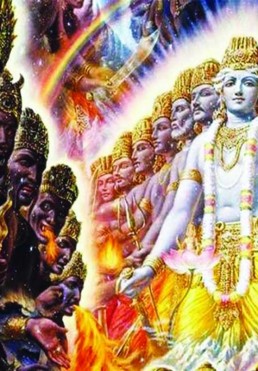
दैवासुरसम्पद्विभागयोग
Daivāsura-Sampad-Vibhāga-Yoga - The Yoga of Differentiating Godly and Ungodly Assets
What are the qualities one must cultivate in order to advance spiritually towards liberation and on the other hand, what are the qualities that will drag us down? Explaining those qualities, this chapter classifies beings into the divinely good (“deva”) and diabolically fallen (“asura”) and describes the behavior of the latter at length. This is so that we may introspect and understand where we stand and correct the course as necessary. Below are the main themes of Chapter 16:
Verses 1 - 3
Daivī-sampat
Verses 4 - 21
Āsurī-sampat
Verses 22 - 24
Arjuna’s grief on seeing the enormity of the task he is about to undertake (śoka)
Gita Chapter 16 - 24 Verses
Chapter 16 - 24 Verses
Commentary by Swami Paramarthananda
Background
In the previous three chapters (XIII, XIV and XV) Bhagavān talked about Self-knowledge (jñānayoga) which is the direct means for lib-eration. In the following two chapters, Kṛṣṇa discusses the values to be followed by a seeker. Though values themselves do not give liber-ation, they are necessary to gain knowledge. They alone prepare the mind and make it fit for receiving the knowledge. In fact, Vedānta is a pramāṇa (means of knowledge) only for a prepared mind.
In this chapter, Kṛṣṇa divides all mental traits into two groups
— daivī-sampat and āsurī-sampat. All sattvic traits come under the former, while rajasic and tamasic traits come under the latter. Daivī-sampat is conducive to Self-knowledge; āsurī-sampat is an obstacle to spiritual pursuit (5). [Without exception, every one in this universe falls under one of these two groups. From this it is evident that all seek-ers of knowledge must necessarily lead a spiritual (sattvic) life avoiding materialistic (rajasic and tamasic) tendencies.]
Kṛṣṇa enumerates daivī-sampat (1 to 3) and āsurī-sampat (4 to 21) which is listed below:
Daivī-sampat
- Fearlessness (1)
- Purity (1, 3)
- Scriptural Study (1)
- Charity (1)
- Sense-control (1)
- Worship of God (1)
- Austerity (1)
- Straightforwardness (1)
- Non-violence, kindness to all and absence of ill-will (2, 3)
- Truthfulness (2)
- Renunciation (2)
- Calmness and patience (2, 3)
- Absence of slander (2)
- Absence of greed (2)
- Gentleness (2)
- Modesty (2, 3)
- Steadfastness and absence of restlessness (2, 3)
- Strength (3)
Āsurī-sampat
- Vanity (4, 10, 14, 15, 17, 18)
- Arrogance (4, 10, 14, 15, 17, 18)
- Pretension (4, 10, 17)
- Anger (4, 12, 18)
- Cruelty (4, 9)
- Ignorance (4, 15)
- Impurity (7)
- Absence of religious discipline
- Absence of truthfulness (7)
- Absence of faith in God (8, 18)
- Endless desire for sense-pleasure (10, 11, 12, 16, 18)
- Delusion (10, 15, 16)
- False values (10, 16)
- Worry (11)
- Attachment (12)
- Greed (12, 13, 14)
- Egoism (18)
- Slander (18)
Āsurī-sampat leads a person astray causing (spiritual) destruc-tion ultimately (19, 20). Kṛṣṇa sums up the entire āsurī-sampat as the three basic materialistic traits of desire, anger and greed. They are the three-fold gateway to hell (21). When one avoids these three traits and adopts the divine virtues, daivī-sampat, one becomes qualified for Self-knowledge and attains liberation soon (22).
The Lord concludes the chapter by pointing out that śāstra is the pramāṇa in determining what is right and wrong. One should know what the scriptures say and act accordingly (23, 24).
The topics in this chapter are:
- Daivī-sampat: 1 to 3
- Āsurī-sampat: 4 to 21
- Importance of śāstra and conclusion: 22 to 24
Since this chapter deals with daiva (spiritual) and āsura (materi-alistic) traits, it is called Daivāsurasampadvibhāga-yoga.

